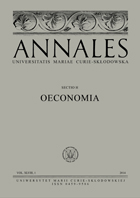Beta and Sigma Economic Convergence of Central and Eastern European Countries to the EU-12
Beta and Sigma Economic Convergence of Central and Eastern European Countries to the EU-12
Author(s): Paulina Pukin-Sowul, Bogdan WłodarczykSubject(s): National Economy, Supranational / Global Economy, Business Economy / Management
Published by: Wydawnictwo Naukowe Uniwersytetu Marii Curie-Sklodowskiej
Keywords: economic convergence; catching up; economic growth; real convergence;
Summary/Abstract: Theoretical background: The concept of the economic convergence process is one of the conclusions of neoclassical growth models, especially the Solow–Swan model. According to it, it is possible to catch up with countries with a lower level of economic development to the economic level of developed countries and to finally equalize the economies of countries. However, endogenous economic theories have indicated that economic convergence is not the only realistic scenario of economic development in the modern economy. Purpose of the article: The aim of the research is to determine the degree of beta and sigma economic convergence of the countries of Central and Eastern Europe to the EU-12 in the years 2004–2021. Research methods: Descriptive statistics and regression analysis were used in the research. The regression analysis was based on a beta and sigma convergence study. The first one was aimed at checking whether less developed countries are characterized by a faster rate of economic growth than more developed states, while sigma convergence made it possible to check whether dispersion in the level of socio-economic development in selected countries was levelled in the years 2004–2021.Main findings: According to the results of the research, it is possible to confirm the existence of beta convergence of the CEE countries compared to the EU-12 in terms of economic prosperity, taking into account the average wealth of citizens (GDP per capita). The economic measure, which is key in the study of economic convergence, is the basis for stating that in the years 2004–2021, there was a process of convergence between the groups of the surveyed EU countries. On the other hand, no reduction in the economic differentiation of the countries studied was observed based on the sigma convergence study.
Journal: Annales Universitatis Mariae Curie-Skłodowska, Sectio H Oeconomia
- Issue Year: LVIII/2024
- Issue No: 2
- Page Range: 137-151
- Page Count: 15
- Language: English

